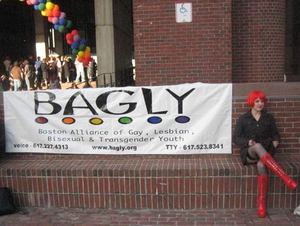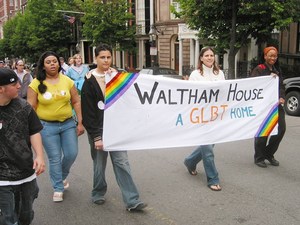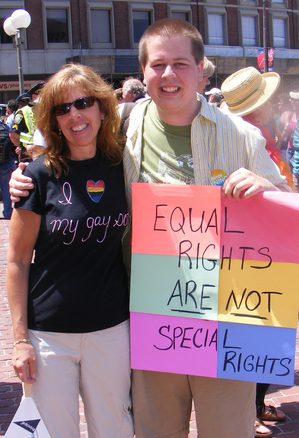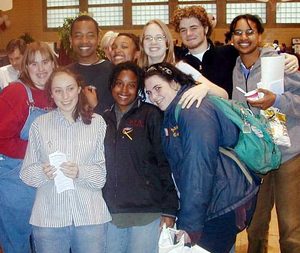Helping Kids
Jessica Flaherty, the director of programs for the Boston Alliance of Gay, Lesbian, Bisexual & Transgender Youth (BAGLY), said the young people who come to BAGLY, which offers support and counseling for GLBT youth ages 22 and under, have unique and varying experiences when they make the decision to come out.
She explained that there is often not much difference between the situations of those who come from communities thought to be socially accepting and those who come from more socially conservative areas.

"Some of them [from more progressive areas] are especially struggling, while others who come from what might be thought of as very conservative places are doing very well," Flaherty said. She emphasized how important it is to understand that each teen's experience is distinctly their own.
Ryan Brown, manager of field operations for Mass Equality, said that he believes the biggest problem GLBT teens face in their struggle for acceptance, both of themselves and by others, is a lack of information.
"In institutions where there is bullying and discrimination that is more prevalent, it's because there are no safe spaces, resources, or mentors for young LGBT or questioning people to access," he explained.
Mass Equality, which was first formed in the late 1990s during the fight for marriage equality in Massachusetts, now also works to uphold those same tenets of equality and preservation of rights for GLBT youth. Unlike BAGLY, Mass Equality isn't a service-based organization that provides personal support and guidance. Rather, Mass Equality advocates for youth through legislation, to make sure that BAGLY and organizations like it have the funding they need to keep working for kids.
One of the most important pieces of legislation that Mass Equality is currently working on is a comprehensive anti-bullying bill to make schools safe places for all students.
"I feel like it is ahead of its time, almost, that it is going to be one of the most comprehensive bills that the entire country has ever seen," Brown said.
He explained that when passing an anti-bullying bill, many GLBT organizations want to see itemized categories that outline specific instances. For example, if a student is bullied because of their sexual orientation or gender, they will be punished for that offense specifically. Brown said Mass Equality is working to make add such specifications to the bill, which is due to be voted on in the next month or so. One part of the bill Brown feels is especially important is an effort to provide training materials for faculty to recognize and prevent bullying. That material will be based on scientific research that determines what kinds of youth are at higher risk to be bullied than others. Which, of course, would include GLBT people.
Brown said that this amendment will provide an important level of customizability, in that schools can update the list of young people who are potentially at risk to be bullied on a frequent basis. The bill will also allows for flexibility in terms of what issues are relevant and pressing in one part of the state in comparison to another.
"I think that's really exciting," Brown said. "It's a way to get those enumerations in a way that will always be relevant and inclusive."
While this sort of legislation will provide support and safety for GLBT teens when they are at school, service-based organizations like BAGLY still see a great need for places and people that youth can go to when class lets out.
Flaherty said many who come to BAGLY need a lot more help and support than their teachers and in-school counselors can give them, well-meaning and well-trained or not.
"Some of these kids come here and they may have been on the brink of being suicidal or homeless," she said. "They come here and are able to construct their own healthy lives."
Flaherty emphasized that they are not trying to fix the kids who come to them for help...because they are not broken. Rather, BAGLY works to provide GLBT youth with the important tools they need to deal with their own problems on a day-to-day basis. Further, she said, they want to give these teens a place that is all their own.
"They are experiencing a world that is organized around heterosexuals," she said. "They're not seeing themselves reflected in their schools or their families."
BAGLY, and many organizations that share a common goal, try to provide these youth with a place, and community, that does reflect who they are. Flaherty said that BAGLY gives GLBT teens a network of supporting adults so that they can create their own social circles and find their own solutions to their struggles. The reward for their work, she said, is self-evident.
"They come back later, as adults, and say 'oh I got this great job or found this great partner'," Flaherty said, "and they're happy!"
And making sure that GLBT adolescents and teens struggling with some very weighty problems grow into successful and happy adults is the whole point.
However, sometimes GLBT youth need more support than even an organization like BAGLY can provide. Sometimes these kids need more than a place to hang out and talk, they need a place to live. Homelessness is a mounting problem among GLBT teens. Some teens are forced out of their homes by families who don't understand or accept them. Other teens decide to leave home on their own. Still others are removed forcibly by organizations like the Department of Children and Families (DCF) due to abuse or neglect.
Providing a Home Base
That's where organizations like the Home for Little Wanderers come in. Originally founded as a orphanage in 1799, the Home now serves as a full-service organization for youth and families across Boston, providing both residential and community-based services. The Home offers a program specifically geared towards GLBT and questioning (GLBTQ) teens, called the Waltham House. The Waltham House is a group home program for GLBTQ youth ages 14 to 18 that seeks to provide a safe haven and day-to-day support for these young people, many of whom have nowhere else to go.
Marc Denofrio is the program director for the Waltham House. Denofrio said that the Waltham House serves as the only home may of the youth who live there have ever known.
"They grew up here," he said. "They're being raised in the system."

The Waltham House is incredibly important because many of the young people who come there would otherwise have been raised in the broader system of foster care and group homes, a system that doesn't provide personal support and therapeutic services for GLBTQ people.
The Waltham House provides daily, one-on-one therapy for each and every one of their residents. Denofrio laments that they can't do more. When the kids turn 19 years old, the House can no longer legally keep them there. Denofrio explained that, in some cases, a 19-year-old member of the program can petition to stay longer, but it isn't always a viable option.
With a foreseeable end in mind, Denofrio and the rest of the House's staff do their best to prepare their wards for that day, so that when the time comes to leave the House, they are as prepared to face the world on their own terms as possible.
"We want to give them the strength to be that person," Denofrio said. "To go off having a better idea of who they are."
He feels that the majority of young people who come through the program are success stories. He said that most of the House's residents keep in touch long after they leave.
"It's awesome, they keep tabs," he said. "They come back after three years of college, and they're doing great."
Denofrio identifies well with the House's charges, because he went through the same process; albeit a bit later in life. He came out when he was 24 years old. Now, at the age of 35, he says that, though he certainly sees a decrease in the discrimination and danger faced by GLBT people, the problem has by no means been eradicated.
He pinpoints complacency as one of the main obstacles in the GLBT fight for equality, complacency in both the country and within the GLBT community.
"Things in Massachusetts are good, but they're not good enough," he said. "We've gotten a few rights and we've stepped back." Denofrio said that it is essential that GLBT people and those who advocate for them not step back or step down, until equal human rights are achieved. He says that there is a level of tempered acceptance in our society today, in that gay people are accepted...as long as they keep quiet about it.
"It is like 'oh right, I totally accept who you are, but can you just tone it down a bit?'," he explained. "That is not ok."
However, Denofrio also pointed to the other side of that issue. He said that he thinks that many young GLBT youth will act out, being as flamboyant as possible, even if that is not who they truly are, as a defense mechanism. He explained that many young GLBT people find it hard to just be who they are, so they play the part of the ultra-flamboyant "gay stereotype," often because they have no role models to let them know it is okay to just be themselves. That, Denofrio asserted, is one of the main aims of the Waltham House's program.
"You can just be yourself, you don't have to play that role," he said. "You can be gay and still play sports."
Though there are many and varied organizations in Massachusetts working to help GLBTQ young people, there aren't as many who address the needs and concerns of those closest to them. Namely, their families.
Support for Parents

The Greater Boston PFLAG (Parents, Families and Friends of Lesbians and Gays) works to provide personalized support for families of GLBT youth.
Lesley Hubbard, an intern at Boston's PFLAG, explained that parents who come to them are often struggling with a broad variety of questions and issues. She said that PFLAG's main objective is to provide a safe and open forum for parents to talk freely about the unique situations they are dealing with in having a GLBT child.
She said that the parents they see are dealing with a very varied range of emotions from "parents coming in for the first time and their kids just came out to them and they're a complete wreck to kids that just came out to them and they're very celebratory and they want to talk about how excited they are," Hubbard said.
She said that PFLAG serves as a network of like-minded individuals sharing a common situation who can provide support throughout the process, whether it is during a challenging or exciting time. PFLAG is unique in that its program is oriented strictly for the families of GLBT youth. Hubbard said that parents are more than welcome to bring their children with them but PFLAG is first and foremost for the adults. Helping the adults deal with their own issues regarding their children's struggles will ultimately help the youth themselves.
Hubbard said a secondary, though no less important, aspect of PFLAG's mission statement, however, is education and outreach. Though they do not offer any youth-oriented groups or programs at their offices, they regularly participate in ant-bullying training in schools across Boston.
Hubbard said that one of their main focuses, during this outreach, is anti "gay-speak" training. She said that many young people use the term "gay" freely, and without regard to its harmful and negative connotations. PFLAG talk to both students and educators about the ramifications of using the word "gay" as a synonym for "stupid," which is rampant among young people. Hubbard explained that many teens use the term without realizing the harm it could cause.

"They're just not aware because it is part of their vernacular," she said. "I always relate it to back when I was in high school, we started the whole "like" thing where every word was 'like' and it was just part of our vernacular. And it's sort of like that. It's part of what they say and what they do and they just don't realize that it actually has implications."
Hubbard said that most of the schools PFLAG visits are widely accepting.
"I can't really say that it's gotten better," she said. "But I can say that whenever we do an engagement in a school we hear positive reports afterwards that there's been a decrease in the language."
Ultimately, what all of the above agencies are working towards is acceptance; acceptance of GLBT people within our society and self-acceptance of GLBT people themselves. Even here in Massachusetts, the first state to legally embrace same-sex marriage, discrimination still lives.
"My straight counterparts don't deal with the discrimination that I have to," Denofrio said. "Until we are completely equal, there is still discrimination."
However, the continued progress and stories of success that both BAGLY and the Waltham House are able to report is evidence that this fight is not in vain, and never inconsequential.
If you, or anyone you know, would like more information or support please visit:
The Greater Boston PFLAG: gbpflag.org
Boston Alliance of Gay, Lesbian, Bisexual & Transgendered Youth: bagly.org
Mass Equality: massequality.org
If one of these organizations can't help you with what you're looking for, they'll find someone who can!




